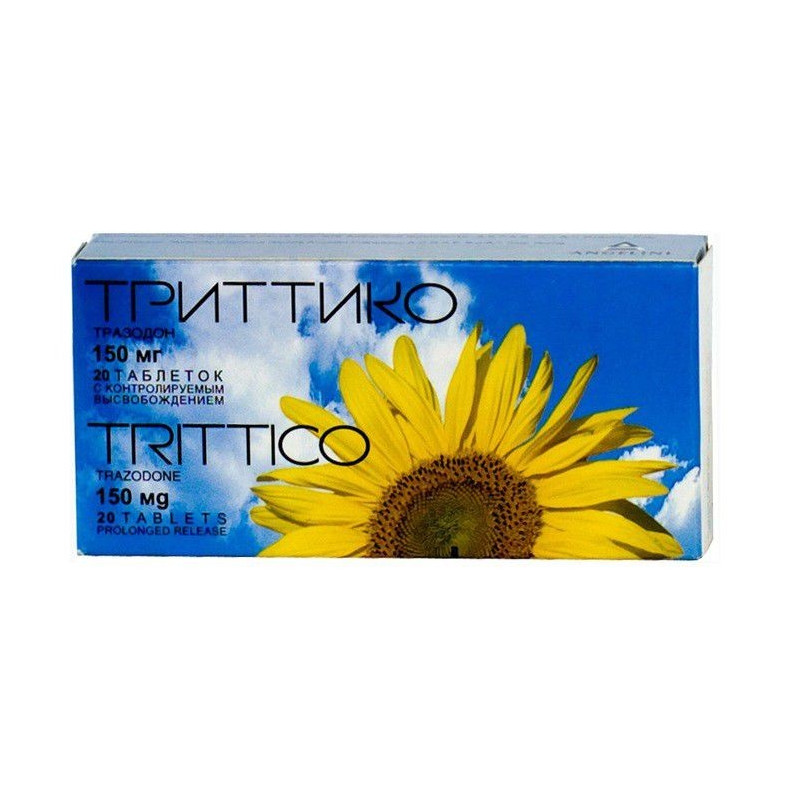



 All payments are encrypted via SSL
All payments are encrypted via SSL
 Full Refund if you haven't received your order
Full Refund if you haven't received your order
In the blister of 10 tablets. In a pack of cardboard 2 blisters.
Trittico is an antidepressant. Trazodone, being a derivative of triazolopyridine, has a predominantly antidepressant effect, with some sedative and anxiolytic effect. Trazodone does not affect MAO, which distinguishes it from MAO inhibitors, tricyclic antidepressants. The mechanism of action of trazodone is associated with a high affinity of the drug for certain subtypes of serotonin receptors, with which trazodone enters into antagonistic or agonistic interaction depending on the subtype, as well as with a specific ability to cause inhibition of serotonin reuptake.
Quickly affects mental (affective tension, irritability, fear, insomnia) and somatic anxiety symptoms (heartbeat, headache, muscle pain, frequent urination, sweating, hyperventilation).Trazodone is effective in sleep disorders in patients with depression, increases the depth and duration of sleep, restores its physiological structure and quality. Trittico stabilizes the emotional state, improves mood, reduces the pathological craving for alcohol in patients suffering from chronic alcoholism during the period of alcohol withdrawal syndrome, also in remission. With withdrawal symptoms in patients suffering from dependence on benzodiazepine derivatives, trazodone is effective in treating anxiety-depressive states and sleep disorders. During remission, benzodiazepines can be completely replaced by trazodone. It helps to restore libido and potency in both depressed patients and non-depressed individuals. The drug is not addictive. It has little effect on the neutral uptake of norepinephrine and dopamine. Does not affect body weight.
- Anxiety-depressive states of an endogenous nature (including involutional depressions).
- Psychogenic depression (including reactive and neurotic depression).
- Anxiety-depressive conditions on the background of organic diseases of the central nervous system (dementia, Alzheimer's disease, atherosclerosis of cerebral vessels).
- Depressive states with prolonged pain syndrome.
- Alcoholic depression.
- Benzodiazepine addiction.
- Disorders of libido and potency.
- Pregnancy.
- Lactation period.
- Children's age up to 6 years.
- Hypersensitivity to the drug.
Precautions should be prescribed to patients with:
- AV blockade.
- Myocardial infarction (early recovery period).
- Arterial hypertension (may require correction doses of antihypertensive drugs).
- Ventricular arrhythmia.
- Priapism in history.
- Renal and / or liver failure.
- As well as patients under the age of 18 years.
The drug is contraindicated for use during pregnancy and lactation (breastfeeding).
The drug is taken orally 30 minutes before a meal or 2-4 hours after a meal. The prescribed dose of the pill should be taken whole, without chewing and drinking plenty of water.
For adults prescribed in the initial dose of 100 mg 1 time / day after meals before bedtime. On the 4th day, you can increase the dose to 150 mg. In the future, in order to achieve the optimal therapeutic effect, the dose is increased by 50 mg / day every 3-4 days until the optimum dose is reached. The daily dose of more than 150 mg should be divided into 2 doses, with a lower dose taken after lunch, and the main dose at bedtime. The maximum daily dose for outpatients is 450 mg. The maximum daily dose for inpatients is 600 mg.
In the treatment of libido disorders The recommended daily dose is 50 mg.
In the treatment of impotencein the case of monotherapy with a drug, the recommended daily dose of more than 200 mg, with combined therapy - 50 mg.
In the treatment of benzodiazepine addiction The recommended treatment regimen is based on a gradual, sometimes over several months, reduction of the dose of benzodiazepine. Each time, reducing the dose of benzodiazepine by 1/4 or 1/2 tablet, 50 mg of trazodone are simultaneously added. This ratio is left unchanged for 3 weeks, then proceed to a further gradual reduction of the dose of benzodiazepines until their complete abolition. After that, the daily dose of trazodone is reduced by 50 mg every 3 weeks.
For elderly and debilitated patients initial dose - up to 100 mg / day in fractional doses or 1 time / day before bedtime. The dose may be increased under the supervision of a physician, depending on the effectiveness and tolerability of the drug. Usually do not require a dose in excess of 300 mg / day.
Children aged 6-18 years: The initial daily dose of 1.5-2 mg / kg / day, divided into several doses. If necessary, gradually increase the dose to 6 mg / kg / day with an interval of 3-4 days.
Nervous system: fatigue, drowsiness, agitation, headache, dizziness, weakness, myalgia, discoordination, paresthesia, disorientation, tremor.
Cardiovascular: decrease in blood pressure, orthostatic hypotension (especially in individuals with vasomotor lability) is due to the adrenolytic effect of the drug, arrhythmia, conduction disturbance, bradycardia, leukopenia and neutropenia (usually minor).
Gastrointestinal: dryness and bitterness in the mouth, nausea, vomiting, diarrhea, loss of appetite.
Other: allergic reactions, eye irritation, priapism (patients who have this side effect should immediately stop taking the drug and consult a doctor).
Symptoms: nausea, drowsiness, hypotension, increased frequency and severity of side effects.
Treatment: There is no specific antidote drug. In cases of overdose, symptomatic treatment is carried out (including gastric lavage, forced diuresis).
Store at a temperature not higher than 25 ° С
Trittico retard